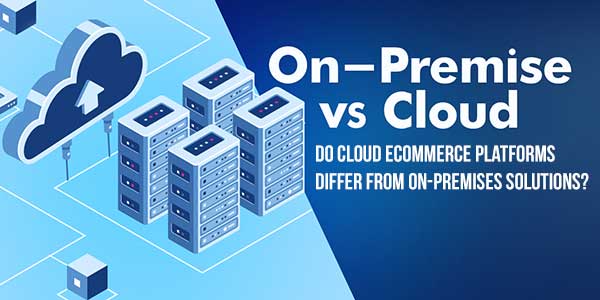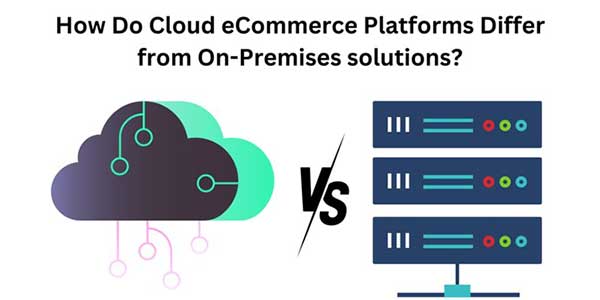
In the past few years, eCommerce stores emerged as the first and most preferred alternative to doing business or shopping things online. This new business model has changed how businesses have been interacting with customers and with other businesses. As this business model supports search, collaboration, and money-related transactions digitally, robust IT solutions play a pivotal role in supporting higher performance, availability, and user experience a customer is experiencing on these sites.
It ignites the question in mind, especially among CTOs and decision-makers: should we deploy the IT infrastructure on-premises or on cloud platforms? Answering the question is significant for the ones starting their eCommerce journey or the ones already running an eCommerce platform to decide where their digital commerce store should live and how much total cost of ownership they need to maintain in either of the choices. Let’s take a look at what you might need to consider for one option over the other when it is required to check for e-commerce app development services from professional companies.
Table of Contents
What Defines A Cloud-Based E-commerce Platform?
A cloud-based eCommerce platform operates on the premise of virtual systems. Much like entrusting your beloved photos to the cloud, hosting an eCommerce platform in the digital realm means it exists without a tangible footprint of data centers within your business’s physical premises. This approach offers a menu of “off-the-shelf” solutions, removing the process of setting up complete IT infrastructure to run an online store.
Customization And Ease Of Setup:
Cloud-based platforms provide a curated selection of pre-made products, allowing you to tailor your brand effortlessly. Setting up an online shop becomes a straightforward process, where you select options that best represent your brand identity. This user-friendly approach is particularly advantageous for business owners without an extensive IT background.
Maintenance And Security:
One of the significant advantages of choosing a cloud-based platform for eCommerce app development services lies in the alleviation of concerns related to maintenance, storage expansion, security, and updates. The burden of these tasks is taken care of by the hosting service that frees business owners and their technical teams to focus on the core aspects of the business. Security measures are implemented by the hosting provider to ensure robust protection against potential threats.
Cost-Efficiency And Accessibility:
Cloud-based eCommerce platforms usually prove to be cost-effective, especially for those who lack the financial resources to build a platform from scratch. With cloud platforms comes the pay-as-you-go model, coupled with the elimination of upfront infrastructure costs. It makes cloud-based hosting of the eCommerce platform an attractive option. Additionally, the accessibility of data from anywhere with a high availability zone enhances the flexibility of managing an online store.
Scalability:
Perhaps one of the most compelling features of cloud-based platforms is their inherent scalability. As your business experiences growth or encounters increased traffic, these platforms seamlessly offer expandable data storage. The ability to scale without the constraints of physical infrastructure ensures your business can flourish without unforeseen obstacles.
Why Do Some Still Prefer On-Premises Platforms?
Despite the evident advantages of cloud-based solutions, on-premises eCommerce platforms continue to maintain a steadfast presence in the digital commerce realm. Understanding the motivations behind this choice requires a closer examination of what an on-premises platform entails.
Control And Ownership:
Opting for an on-premises solution signifies a commitment to having a physical server within your business premises, ideally at the headquarters. This choice demands a substantial investment of both time and financial resources. However, the payoff is complete control and ownership of your eCommerce platform. Unlike cloud-based options, on-premises platforms provide businesses with the autonomy to shape their product according to their unique vision.
Customization And Performance:
One of the primary draws of on-premises platforms is the unparalleled customization they offer. With no set list of features to choose from, businesses can craft a platform that aligns precisely with their requirements. The performance of an on-premises platform, contingent on the competence of those responsible for its development and deployment, can outshine that of cloud-based counterparts. This is particularly advantageous for businesses that prioritize a highly tailored and high-performance online presence.
Flexibility In Updates And Maintenance:
On-premises platforms provide the flexibility to incorporate updates and perform maintenance according to the business’s schedule, independent of external hosting providers. This autonomy ensures that businesses can optimize their platform’s performance without relying on predefined maintenance schedules.
The Original Type Of E-commerce Platform:
Considered the pioneer of eCommerce platforms, on-premises solutions take us back to the roots of digital commerce. Despite significant advancements in the digital realm, the on-premises infrastructure model remains attractive to those who cherish tradition and seek complete control over their online store.
General Rules When Shopping For A Suitable Platform:
Navigating the vast sea of eCommerce platforms requires a strategic approach. Whether you decide to go with a cloud-based or on-premises solution, certain principles guide the decision-making process, which you must look into while making a wise decision.

What Considerations Should You Keep In Mind For Cloud-Based Platform Options?
While cloud-based platforms offer an array of benefits, a discerning eye is essential when selecting the right fit for your business. Mostly, an experienced cloud consulting company counts on your business requirements and suggests all possible benefits of hosting or moving to hybrid or multi-cloud platforms. Before interacting with them, you may also look into the following considerations that come with hosting a platform on the cloud.
1.) Security Considerations:
One of the potential drawbacks of cloud hosting is the relinquishing of sole responsibility for data security. Some business owners prefer to maintain control over the security of their data, including sensitive customer information. Before committing to a cloud-based solution, thoroughly assess the security measures implemented by the hosting provider to ensure they align with your business’s standards.
2.) Control And Personalization Limits:
Despite the convenience of pre-made solutions, cloud-based platforms may have limitations when it comes to customization. It’s crucial to recognize that while personalization options exist, they may not be infinite. Evaluate the level of control you wish to retain over the appearance and functionality of your eCommerce site and ensure it aligns with the offerings of the chosen cloud platform.
3.) Ease Of Setup Vs. Tailored Features:
Cloud-based platforms excel in ease of setup, making them ideal for those without an extensive IT background. However, this simplicity may come at the cost of more tailored features. Consider the balance between ease of use and the specific features your business requires when making your decision.
What Do You Need To Consider For On-Premises Platform Selection”
On-premises platforms come with their own set of considerations, requiring careful evaluation before making a commitment.
1.) Cost Implications:
One of the significant factors to consider with on-premises solutions is the cost. Building and maintaining an on-premises eCommerce platform necessitates a robust IT team, translating to human resource costs, time investment, and inevitable expenses. It’s essential to weigh these costs against the potential advantages of full control and customization.
2.) Scalability Challenges:
Scalability can pose a challenge for on-premises platforms. If data storage becomes a bottleneck due to increased traffic or business expansion, scaling up may require substantial effort and, in some cases, the purchase of additional servers. This contrasts with the ease of scaling up offered by cloud platforms, where a simple plan upgrade suffices.
3.) Balancing Initial Costs And Long-Term Benefits:
The initial cost of an on-premises option can be substantial, especially when factoring in the development of a robust IT infrastructure. However, for some businesses, the long-term benefits of complete control, customization, and potential cost savings over time may outweigh the initial investment.
4.) The Trade-Off Between Team Sustainability And Cloud-Based Fees:
Maintaining an in-house IT team comes with its own set of challenges and costs. Businesses need to strike a balance between sustaining a team and potentially paying a monthly fee to a cloud-based provider. This decision requires careful budgeting and consideration of the ongoing costs associated with each option.
Conclusion:
The choice between a cloud-based and on-premises eCommerce platform is a pivotal decision that hinges on the unique needs and priorities of your business. Each option comes with its own set of advantages and considerations, and a comprehensive evaluation is essential to ensure the chosen platform aligns seamlessly with your digital commerce goals.

 About the Author:
About the Author:















Be the first to write a comment.